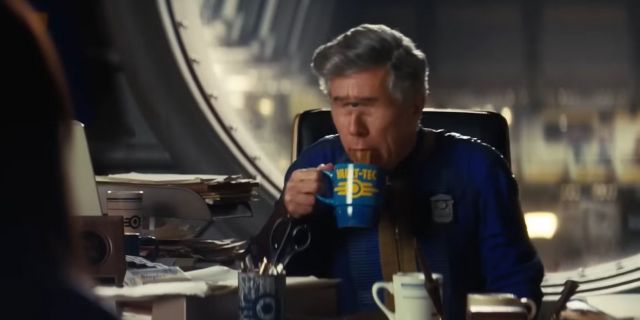Fallout has kept its social commentary relatively light in the early episodes. The first three outings barely mentioned communism. The first two games read like satire written by a robot that grew to hate its creators. Fallout 3 and its successors were less aware. This left the show somewhere in limbo. “The Trap” features some of the most explicit satire in the series so far. It’s incisive, but still endlessly entertaining.
Frederick E. O. Toye directed Fallout‘s sixth episode. Toye previously worked with Jonathan Nolan and Lisa Joy on Westworld, helming three episodes. He also routinely works with J. J. Abrams, with whom he worked on Alias and Fringe. Toye recently directed three episodes of Amazon Prime’s The Boys, oddly taking on the fourth episode of each season. His 2021 finale of HBO’s Watchmen is seen by many as the series’ best moment.
As Fallout‘s only character old enough to remember the time before the Great War, Cooper Howard enjoys several critical flashbacks. The episode begins with a pre-war advertisement for the Vaults, boldly proclaiming that it’ll protect survivors from nuclear radiation and communists. A family of scientists will live five years in Vault 4 as an experiment, eventually sectioning off that vault for similar thinkers. The ad is chilling, but it leads into an afterparty at the Howard household. The only guest he’s happy to see is Matt Berry’s character Sebastian. Berry assures him that the future is in products and that only those who can sell the apocalypse will stay on top. Howard later meets with the fantastic Dallas Goldtooth’s character, Charles Whiteknife. Whiteknife is the only person in the plot paying attention, and though Howard isn’t ready to listen, the Native American actor’s words take hold in Howard, prompting him to go to a meeting. This political game is fascinating for several reasons, despite its outcome having been settled centuries earlier.

Howard recalls his past while being captured and escorted to the headquarters of another dangerous faction. The Government, represented by two heavily accented cowboy types, picks up the Ghoul for the destruction of the Super Duper Store he took to living in. Of course, Lucy destroyed the store, killed the owners, and freed their ghouls, but the Ghoul happened to be there when the cops came. Since the Ghoul refuses to rat, he’s dragged to the office of one Sorrel Booker, an old friend in a new position of power. Booker is a disgusting man, but his “law and order” platform requires harsh punishment. As the Ghoul turns the tables on the Government, he unleashes more of his backstory to a hungry audience. The back and forth is engaging, but most of this episode’s best moments take place in the distant past. Howard arguing with his wife about the fate of the future is stellar, as is his conversation with Whiteknife.
Meanwhile, Maximus and Lucy find themselves in Vault 4. Though initially set aside for scientists, the current population consists mainly of survivors of the Sandy Springs bombings. Max is immediately ill at ease, viewing their cult-like kindness as a red flag. Conversely, Lucy feels at home again. They notice an odd contingent of the population boasting unusual mutations, including Chris Parnell as Ben, the Overseer who happens to be a Cyclops. As Lucy listens to Ben’s frustratingly familiar “I’m not racist, but” speech and observes local traditions, her comfort fades. Conversely, Maximus slowly acclimates to the comforts of vault life, experiencing pleasures denied to him by years of military service. As their roles reverse, Lucy discovers a nightmarish secret underpinning Vault 4 that could threaten the lives of everyone hiding out within its walls. Vault 4 unleashes some horrific elements, easily topping the ghouls from the fourth episode. New developments in this chapter could turn into the main conflict in the final outings.
As Fallout keeps introducing new elements, characters, and conflicts, it becomes increasingly unlikely that they’ll be able to satisfactorily wrap everything up within two hours. The current state of the series is extremely positive, consistently delivering tantalizing hints to various mysteries. This is an exceptionally binge-able show, seemingly meant to be watched in one or two sittings. Fans will be waiting with bated breath for another season if one is still on the horizon. The finale will likely make or break what has been a solid series so far.

“The Trap” maintains the high standard of quality seen in every other episode of Fallout. Its strange digressions, some of which don’t work out, feel like half-formed sidequests in one of the games. Every new reveal sets the stage for something more exciting. Every new domain escalates the stakes. Fallout is one of the best video game adaptations on the small screen without question. As weird as it gets, the show shows no signs of slowing down. The next episode will likely drop the metaphorical bomb after several physical ones.











Leave a Reply